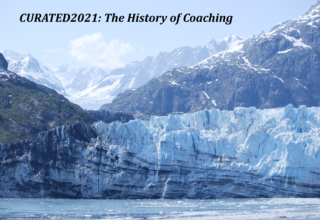
REFERENCES
Bergquist, W (2009a). Natalie and John: A narrative perspective on the past and present dilemmas and opportunities facing organizational coaching. International Journal rf Coaching in Organizations, 7(1), 6-26.
Bergquist, W (2009b). Natalie and John: A narrative perspective on the future hopes and fears facing organizational coaching. International Journal ef Coaching in Organizations, 7(1), 66-80.
Brock, V.(2009a). Professional challenges facing the coaching field from an historical perspective. International Journal of Coaching in Organizations, 7(1), 27-37.
Brock, V. (2009b). Coaching pioneers: Laura Whitworth and Thomas Leonard. International Journal of Coaching in Organizations,7(I), 54-64.
Coutu, D., & Kauffman, C. (2009a). The realities of executive coaching. Harvard Business Review (Research Report), 1-25.
Coutu, D., & Kauffman, C. (2009b). What can coaches do for you? Harvard Business Review (January), 91-97.
Cronon, W. (1992). A place for stories: Nature, history, and narrative. The Journal of American History, I 347-1376.
Drake, D.B. (2007). An integrated approach to coaching: The emerging story in a large professional services firm. International Journal of Coaching in Organizations, 5(3), 22-35.
Drake, D.B. (2008). Finding our way home: Coaching’s search for identity in a new era. Coaching: An International Journal of Theory, Research and Practice, 1(1), 15-26.
Drake, D.B. (2009a). Coaching and the freedom to learn: A conversation with Tim Gallwey and John Whitmore. International Journal of Coaching in Organizations, 7(1), 38-53.
Drake, D.B. (2009b). Evidence in action: A relational view of knowledge and mastery in coaching International Journal of Evidence Based Coaching and Mentoring, 7(1), 1-12.
Drake, D.B., & Brennan, D. (2008). Grundlag for hab: Kritiske samtalar om coachingens fremtod (Grounds for hope: Critical conversations on the future of coaching). In K. G0rtz & A. Prehn (Eds.), Coaching i perspektiv (Coaching in perspective) (pp. 326-344). Copenhagen: Hans Reitzels Publishers.
Jackson, P., & Cox, E. (2009). The philosophical influences that have shaped coaching. International Journal of Coaching in Organizations, 7(1), 81-103.
Lenhardt, V. (2004). Coaching far meaning: The culture and practice of coaching and team building (M. Stewart, Trans.). London: Palgrave Macmillan.
Page, L. (2009). Neurosocial dynamics: Toward a unique and cohesive discipline for organizational coaching. International Journal of Coaching in Organizations, 7(I) 104-137.
Stein, J.O., & Stein, M. (1987). Psychotherapy, initiation and the midlife transition. In L.C. Mahdi, S. Foster & M. Little (Eds.), Betwixt & between: Patterns of masculine and feminine initiation (pp. 287-303). La Salle, IL: Open Court.
Wenger, E., McDermott, R., & Snyder, W.M. (2002). Cultivating communities of practice: A guide to managing knowledge. Boston: Harvard Business School Press.
Download Article 1K Club















